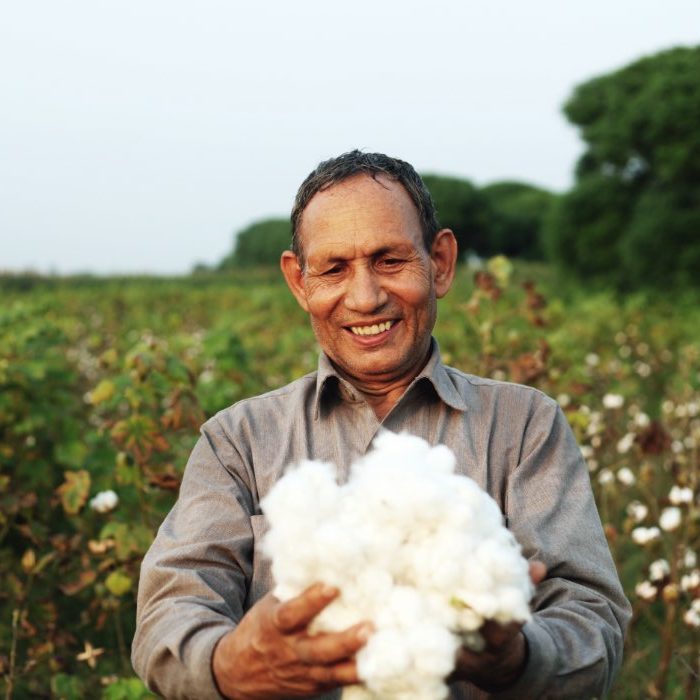Fairtrade cotton
The independently controlled Fairtrade label stands for the support of small farmers and workers in the producing countries. Textile factories that process Fairtrade cotton separately are required to comply with ILO core labour standards – an additional protection for textile workers.
INDICATORS

> GRI 102-9
> GRI 102-12
> GRI 102-29
Sustainable supply chain development also means sourcing responsibly on international markets. Since 2017, we have met Fairtrade’s criteria to use the Fairtrade Cotton label. The seal shows that the cotton has been grown and traded according to the strict international Fairtrade standards. Cotton farmers benefit from long-term and better trade relations as well as environmental and climate protection. Where it says Fairtrade, it doesn’t just say fairness. It also guarantees that the cotton can be traced all the way back to the field. Every certified producer must adhere to a whole set of environmental and social standards.
External links
→ Fairtrade
→ Fairtrade options
→ Background: Fairtrade cotton
6 good reasons for Fairtrade
The independently controlled Fairtrade label stands for the support of small farmers and workers in the producing countries. Textile factories that process Fairtrade cotton separately are required to comply with ILO core labour standards – an additional protection for textile workers.
By paying Fairtrade minimum prices, fluctuations on the world market are absorbed and the cotton farmers’ costs for sustainable production are covered.
The additional premium of 5 cents per kilogram of Fairtrade cotton is used by the cooperatives for community projects, for example, education, health or infrastructure projects
The ILO core labour standards, which prohibit exploitative child labour and forced labour, apply throughout the supply chain.
All processing stages are obliged to comply with ILO core labour standards. The cooperatives and organisations in which cotton producers join together are democratically run and thus strengthen their negotiating position.
Strong environmental standards are in place to protect workers’ health and safety, preserve nature and ban genetically modified seeds and hazardous chemicals. In addition to advice and training on sustainable agriculture, the cultivation of organic cotton is promoted.
Due to the strict specifications, 100% traceability back to the cotton field is possible.
Independent inspectors regularly check compliance with the Fairtrade standards.
Fairtrade options at Kettelhack
At Kettelhack, we offer our customers two different options to implement their Fairtrade commitment.
- 100% Fairtrade cotton in the end product
- Physical traceability of all production stages back to the cotton field
- Separate processing at each stage of production
- Proof of compliance with ILO core labour standards at every stage of production
- Prerequisite: Minimum percentage of cotton in the end product (50 % or 30 % for workwear).
- Proof of certification: All stages of production – including distributors – have Fairtrade certification
- Communication: Marking on the product by means of a seal
- Purchase of a certain amount of certified Fairtrade cotton
- Indirect traceability via mass balancing
- Separate processing and proof of compliance with ILO core labour standards up to the spinning/weaving mill
- Full flexibility: No restrictions on minimum cotton content in the end product and self-defined volume development
- Register instead of certify: Companies register as participants in the cotton programme, certification is not necessary
- Communication: Dedicated labelling on the product is possible depending on the quantities purchased.
Further articles on the topic
Our supply chains
Sustainability in the textile industry means much more than just processing ecologically produced cotton. ...
Our fibre stars
The high quality and durability of our fabrics already contribute to sustainability. Because the more ...
Fairtrade cotton
The independently controlled Fairtrade label stands for the support of small farmers and workers in the...



